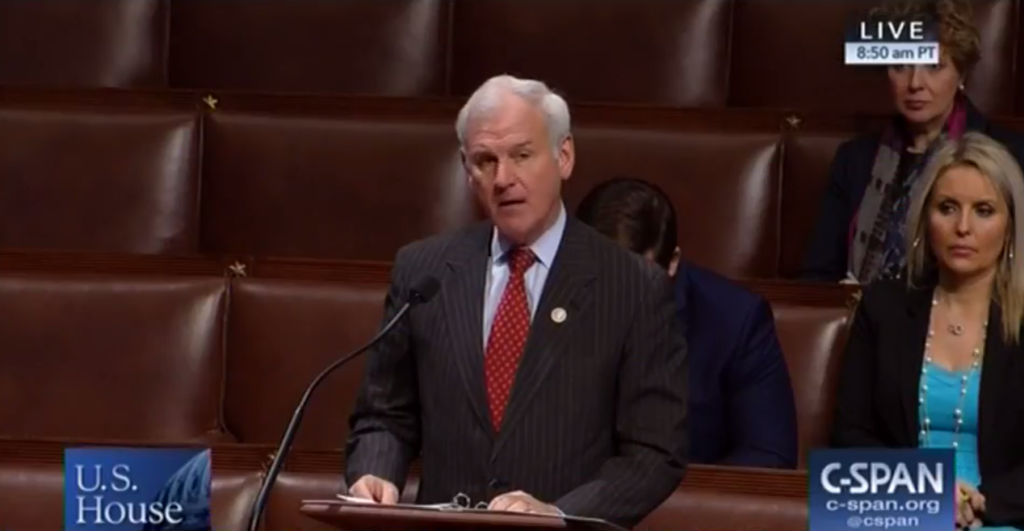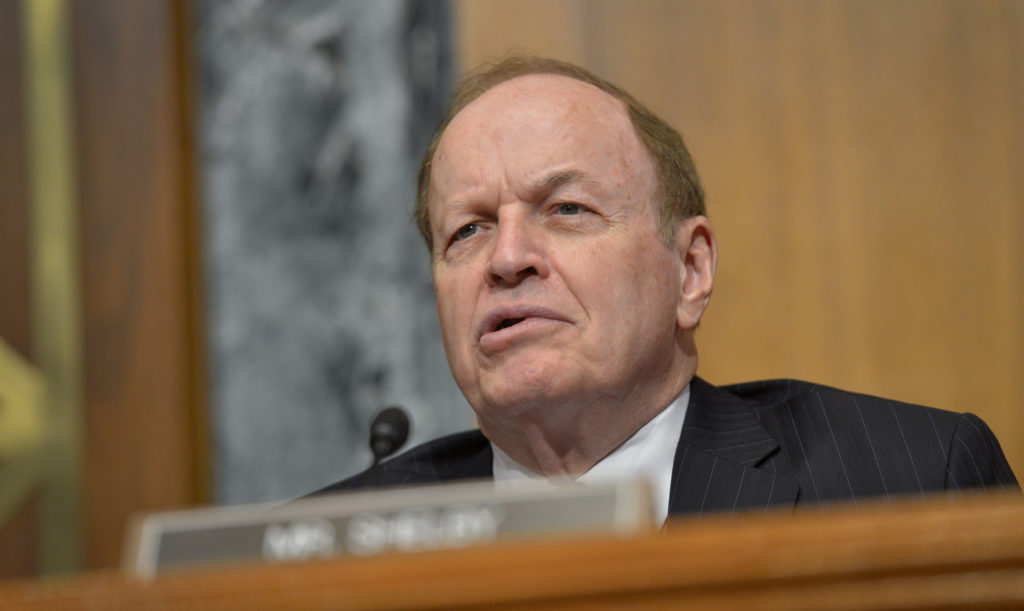Steve Marshall leads effort to protect states’ rights, prevent TVA rate increase

Alabama is leading the fight against a federal court ruling that would undercut state authority to regulate its own groundwaters and would result in debt to the Tennessee Valley Authority (TVA), causing rate increases that could leave many customers in Alabama and other states unable to afford electricity. Joined by Kentucky Attorney General Andy Beshear, Alabama Attorney General Steve Marshall filed an amicus brief on Tuesday evening in the U.S. Circuit Court of Appeals for the Sixth District arguing a federal judge’s order to excavate a coal ash pond in Tennessee “usurps States’ authority to regulate groundwaters” in the case of Tennessee Clean Water Network v. TVA. According to the brief: “The lower court’s remedy, ordering closure of the Gallatin ash ponds by excavation and removal, would cost approximately $1.8 billion to 4.0 billion. As TVA will pass this cost on to its captive utility customers, such a costly remedy will have an unanticipated, immediate, and profound impact on utility ratepayers. If this Court upholds the lower court’s remedy, and closure-by-removal is subsequently applied throughout the Sixth Circuit, the resulting costs to utility customers would be astronomical, costing in the tens-of-billions of dollars.” Yikes. Under the Clean Water Act (CWA), Congress designated states as the main controllers of groundwater pollutants.The issue, however, is whether or not “hydrological connectivity” (the theory that the groundwaters might connect to navigable waters) could extend federal control to groundwater pollutants. Using this approach, a lower court has ordered that the TVA clean up a coal ash pond at its Gallatin coal plant using a close-by-removal procedure rather than the TVA’s preferred close-in-place method. “Not only is this matter clearly designated for state rather than federal regulation and the proposed remedy unnecessary and overwhelmingly costly, but the theory of hydrological connectivity could be extended to ridiculous circumstances,” said Marshall. “For example, owners of large parking lots could find themselves subject to CWA citizen suits as storm water runoff mixes with petroleum products discharged by cars parked on pavement, and may make its way into groundwater and eventually ‘navigable water.’ The same logic extends to runoff from state, county and municipal roads and highways.” 16 other states are joining Alabama and Kentucky in support of the brief: Arkansas, Georgia, Indiana, Kansas, Louisiana, Mississippi, Missouri, Montana, Nebraska, Oklahoma, South Carolina, Texas, Utah, West Virginia, Wisconsin and Wyoming.
Alice Martin qualifies for Alabama Attorney General race

Wednesday, during a press conference at the Alabama Republican Party Headquarters in Birmingham Ala. Alice Martin announced her qualification for Attorney General in the June 5 Republican primary. Martin is a conservative Republican with a record of fighting public corruption, white collar and violent crimes at the local, state, and federal levels. She was a member of the team that convicted former House Speaker Mike Hubbard, and successfully advocated for SB301, which combats technology based sex crime. She has spent the last five years serving as the Chief Deputy & Deputy Attorney General in Alabama. There, she’s used her position to fight against the Obama Administration’s federal overreach through the EPA and same sex bathroom mandates. She is an active member of the Alabama Federation of Republican Women, the Federalist Society, and a former member of the Alabama Republican Club Executive Committee where she served as Secretary in 2001. Martin earned her Bachelors degree in Nursing from Vanderbilt University then worked her way though law school at the University of Mississippi. Martin previously served as a municipal judge, a Circuit Court Judge in Florence, Ala. and a U.S. Attorney. She was named a “Top 10 Prosecutor in the U. S.” by Corporate Fraud Reporter. During her time as a U.S. Attorney, Martin prosecuted over 4,600 federal firearms, narcotic, and child pornography crimes, resolved over 8,200 civil cases and established an anti-terrorism task force. She also joined then-Alabama AG Bill Pryor to found the North Alabama Public Corruption Task Force and together they secured 140 federal corruption convictions. Martin and her husband have three adult daughters, live in Florence Ala. with their 10 dogs and are members of the First United Methodist Church.
Riggs Walker qualifies to run for Alabama Court of Criminal Appeals

Riggs Walker has formally qualified as a candidate for Place 1 on the Alabama Court of Criminal Appeals in the June primary elections. Walker hopes to replace Judge Samuel Welch who has maintained the position for the past 11 years and will not be seeking re-election this year. Riggs has spent the last 19 years living and working in the Birmingham, Ala. area prosecuting thousands of criminal cases including murders, burglaries, assaults and theft cases. He graduated from Jones School of Law, at Faulkner University in 1998 and from there went to work for Circuit Judge William A. Shashy in the 15th Judicial Circuit. He later moved to Birmingham to work as a deputy district attorney in the Jefferson County District Attorney’s office. According to a press release announcing his candidacy, Walker is a committed conservative who believes in personal responsibility, individual liberty and a constitutionally limited government. He thinks that these values, coupled with strong communities built by strong families are critical to meeting the criminal justice challenges facing our state today. Walker believes these principles will allow him to deliver just verdicts fairly while maintaining the rule of law. “There are profound challenges in our society today. However, justice rightfully administered should provide hope and a guiding light for future generations.” said Walker. Walker is an active member in several Republican organizations, and serves as a committee member on the Jefferson County Republican Executive Committee. He is engaged in his community, volunteering for Homewood city schools and attending Covenant Presbyterian Church with his wife Cheryl, and their two daughters.
Alabama plant figures prominently in Mercedes-Benz global electric vehicle initiative

Mercedes-Benz said it will have an electric version of all vehicles by 2022 as part of a global initiative that has its Alabama plant playing a pivotal role. “Our electric vehicles will be built in six plants on three continents,” said Markus Schäfer, member of the Divisional Board of Mercedes-Benz Cars, Production and Supply Chain. “We address every market segment: from the Smart for two to the large SUV.” Mercedes-Benz U.S. International, the company’s Alabama operations in Tuscaloosa County, is its only U.S. plant and will produce electric versions of the vehicles on the assembly line there. MBUSI makes the C-Class sedan for the North American market and the GLS and GLE SUVs and the GLE Coupe for the U.S. and global markets. Jason Hoff, CEO of MBUSI, said the Alabama plant is gearing up to make electric vehicles. Mercedes said the Hambach, Germany, plant is producing the Smart fortwo Coupe and Cabriolet, which are the first cars in the next generation of EVs. The Mercedes plant in Bremen, Germany, will produce the EQC, an all-electric SUV, starting next year. That will be followed by other vehicles in the EQ line that will be built at BBAC, a joint venture between Mercedes parent company Daimler and BAIC in China. Mercedes plants in Rastatt and Sindelfingen, Germany, will join the Tuscaloosa plant as the next three to add EV production.“Building an electric car, obviously, is going to bring some new challenges and we’re going to build electric cars right alongside our regular combustion engine cars and that’s going to be an interesting challenge – how we integrate different technologies, different production processes into our traditional processes,” Hoff told Alabama NewsCenter during a Facebook Live broadcast from MBUSI last month. “But we’re excited about it, we’re already getting the work started. We’ve got the first few people working on it and it will just develop from there.” In September, Mercedes used its 20th anniversary of producing vehicles in Alabama to announce a $1 billion expansion that will produce batteries, hybrid and electric vehicles at the plant. “Mercedes’ decision to build a battery factory and launch electric vehicle production in Alabama positions the state as a leader in a disruptive technology that is poised to dramatically change the direction of the auto industry,” said Greg Canfield, secretary of the Alabama Department of Commerce. “This sends a powerful message that automakers operating in Alabama will be involved in the industry’s most advanced technologies and that the state is ready for what’s coming next.” Mercedes said the battery initiative goes hand-in-hand with the vehicle production. “The battery is the key component of e-mobility,” Schäfer said. “As batteries are the heart of our electric vehicles we put a great emphasis on building them in our own factories. With our global battery network, we are in an excellent position: As we are close to our vehicle plants we can ensure the optimal supply of production. In case of a short-term high demand in another part of the world, our battery factories are also well prepared for export.” Mercedes is investing more than $12.3 billion to expand its electrical fleet around the world, along with an additional $1.2 billion in a global battery production network. “The electric initiative of Mercedes-Benz Cars is right on track,” Schäfer said. “Our global production network is ready for e-mobility. We are electrifying the future.” Having its Alabama plant play a pivotal role speaks volumes, officials said. “Mercedes-Benz has called its global electric initiative an ‘important strategic course’ for the future, so its decision to build electric vehicles in Tuscaloosa makes an incredibly strong statement about how much confidence the company has in Alabama and its workforce,” said Steve Sewell, executive vice president of the Economic Development Partnership of Alabama. “Alabama has earned a place in the Mercedes global manufacturing network as an important location where the company can carry out bold and ambitious plans.” Hoff said it’s fitting that the plant that started SUV production for Mercedes more than two decades ago is taking the lead in the future of SUV production for the automaker. “We’re the home of the SUVs and that’s really what we’re known for and what we stand by,” he said. “With the expansion of now an electrical SUV in the future, we feel that kind of cements our place with being the home of the SUVs.” Republished with permission from the Alabama NewsCenter.
30 Days to Pay bill would extend time to repay payday loans

Another legislative session, and another attempt to reform payday lending has made it’s way to the Legislature’s to-do list. Decatur-Republican State Sen. Arthur Orr is leading the fight to put an end to the state’s predatory lending practices in the state Senate. Orr has introduced SB138, the 30 Days to Pay bill, which would give borrowers 30 days to pay payday loans back, versus the current 10 to 14. Advocates for reform say the average interest rate for the payday loans in the Yellowhammer State is a whopping 300 percent, but with refinancing and missed payments, that rate can get as high as 456 percent, which they say trap borrowers in a debt cycle. In 2015, the Alabama Department of Banking established a database to enforce an existing law that limits people to borrowing no more than $500 at a time. The database revealed that for the period between Oct. 2015 and Sept. 2016, more than 2 million payday loans totaling $668 million were taken out, by roughly 239,000 Alabamians and borrowers paid $116 million in fees in 2015-2016. Between the same period of time from 2016-2017, another 1.83 million payday loans were taken out by over 214,000 consumers totaling nearly $615 million and borrowers paid $107 in late fees.
Public transportation bill moves through state legislature

Alabama is one of only five states with no state funding for public transportation. A bipartisan pair of state legislators is hoping to soon change that. Birmingham-Democrat state Sen. Rodger Smitherman and Vestavia-Republican state Rep. Jack Williams have each sponsored legislation, SB85 and HB10 accordingly, that would create the Alabama Public Transportation Trust Fund to fund activities that increase public transportation options across the state. According to the proposed legislation, the fund would be maintained and administered by the Alabama Department of Economic and Community Affairs (ADECA). ADECA would make its decisions based off of recommendations made by a 13-member advisory committee. Alabama Arise — a statewide nonprofit, nonpartisan coalition of congregations, organizations and individuals promoting public policies to improve the lives of low-income Alabamians — is one of the voices who has come out support of the legislation. The organization held a press conference at the State House on Tuesday, as part of their 2018 Legislative Day, advocating on the legislation’s behalf. “Alabama Arise has been working on this since the 1990s, when people were transitioning from welfare to work. That transportation aspect has been the hardest part,” said Kimble Forester, executive director of Alabama Arise. “This is one area where we have gone backwards. Public transportation is in the future.” The trust fund would be supported by state funds and would also allow the state to apply for federal public transportation grants. “The state loses out on millions of dollars of transportation dollars every day. We are supporting legislation this year by Senator Rodger Smitherman and Rep. Jack Williams,” added Alice Paris, chair of Alabama Arise’s legislative committee. The Senate voted 26-0 for Smitherman’s bill in late January. Meanwhile, Williams’ bill won overwhelming House committee approval earlier in the month and is now awaiting a full House vote.
House passes Bradley Byrne’s reforms to Congressional workplace

The U.S. House of Representatives passed legislation to update the way Congress handles sexual harassment and other employment law claims, including a number of provisions championed by Alabama 1st District U.S. Rep. Bradley Byrne on Tuesday. As a former labor and employment attorney, Byrne has been part of a group of bipartisan lawmakers writing the reform legislation. The bill fundamentally reforms how sexual harassment and other employment law claims are handled to make the process fairer, smoother, and more transparent. “This bipartisan legislation is a shining example of how Congress should work. Republicans and Democrats came together to bring the Congressional workplace into the 21st Century and ensure that Congress plays by the same rules as the private sector,” said Byrne. Last November, Byrne testified before the House Administration Committee to share his ideas about reforming the way sexual harassment and other employment law claims are handled on Capitol Hill. Among his recommendations that were included in the final bill were: Requiring mandatory harassment training for all Members of Congress and staff; Ensuring all House offices have an anti-harassment/anti-discrimination policy; Making the Congressional Accountability Act (CAA) process mirror what private businesses are subject to through the Equal Employment Opportunity Commission (EEOC); Giving investigatory authority to the Office of Compliance (OOC); Not requiring all claimants to go through mandatory mediation and counseling; Subjecting unpaid interns, pages, fellows, etc. to the CAA’s anti-discrimination provisions; Making Members of Congress personally financially responsible for paying any settlements or awards associated for a harassment or discrimination claim the member committed; Publishing information regarding sexual harassment and other employment law claims and settlements; Prohibiting Members of Congress from engaging in a sexual relationship with members of their staff; and Making Member-on-Member sexual harassment a violation of the Official Code of Conduct. All of those recommendations were adopted today by the House in H.R. 4924, which makes changes to statutory law and requires Senate action, or H.Res.724, which changes House specific rules and practice and will be implemented immediately. Watch Bryne’s speech below: The full text of Byrne’s speech can be found below. I thank the Chairman for yielding. Prior to coming to Congress, I worked for thirty years as a labor and employment attorney in Alabama. I advised clients on how to prevent sexual harassment and how to navigate the process if a harassment claim was made. Quite frankly, I was shocked to see how complicated the Congressional process for handling sexual harassment and other employment law claims was. Mr. Speaker, this legislation is a shining example of how Congress should work. Chairman Harper and Ranking Member Brady engaged a bipartisan group of Members, including Rep. Jackie Speier and myself, interested in solving this problem. After months of thoughtful negotiation, we come to the floor today with a product that this House and the American people can be proud of. Under this legislation, we will bring the Congressional workplace into the 21st Century and ensure that Congress plays by the same rules as the private sector. There are far too many important reforms to mention all of them, but I want to highlight a few that I think are especially transformative. First, the bill creates a fairer and simpler process for employees to file an employment law claim and for the claim to be resolved. The bill creates an office of employee advocacy to ensure staff has access to legal counsel, just as Member offices are provided. The process is also simplified to make the claims process smoother, faster, and fairer. Second, the bill increases transparency by requiring that basic information about any sexual harassment or other claims be made public so the American people are fully aware of what is happening in the Congress. Third, the bill will ensure that Members of Congress, not taxpayers, are responsible for paying out sexual harassment settlements. Fourth, the related resolution paves the way for every Congressional office to have a clearly defined anti-harassment and anti-discrimination policy. This reform alone will result in greater awareness. Fifth, the resolution prohibits Members of Congress from engaging in a sexual relationship with any staff member under their supervision and makes clear that sexual harassment is a violation of the Code of Official Conduct and will not be tolerated. In closing, I want to again thank Chairman Harper and Ranking Member Brady for their leadership on this issue, and I strongly urge my colleagues to support this bipartisan legislation and the related resolution.
Here’s who’s qualified to run for the Alabama State House thus far

Alabama candidates began qualifying for major 2018 races last month. Now, with just three days remaining to officially qualify for the June Democratic and Republican primaries several more candidates both parties are filing documents to make cut. Thus far, 170 total candidates have qualified to run for the State House. Of those candidates, 114 are Republican and 56 are Democrats. Republicans are running in 79 of the 105 State House Districts and Democrats in 43. Districts 53 and 55 have no candidates running from either party. Below is the list of candidates the Alabama Republican and Democratic Parties have qualified thus far: House District 1 Phillip Pettus (Republican) House District 2 Lynn Greer (Republican) Lora Kay Morrow (Democrat) House District 3 Andrew Sorrell (Republican) Humphrey Lee (Republican) House District 4 Tom Fredricks (Republican) Parker Duncan Moore (Republican) House District 5 Danny F. Crawford (Republican) House District 6 Andy Whitt (Republican) House District 7 Ken Johnson (Republican) House District 8 Terri Collins (Republican) Rebecca Browne (Democrat) House District 9 James R. Bowling (Republican) Justin Morrow (Republican) Scott Stadthagen (Republican) House District 10 Mike Ball (Republican) House District 11 Randall Shedd (Republican) House District 12 Alex J. Chaney (Republican) Corey Harbison (Republican) House District 13 Connie Cooner Rowe (Republican) House District 14 Richard “Bull” Corry (Republican) Tim Wadsworth (Republican) House District 15 Allen Farley (Republican) Suzanna Coleman (Democrat) House District 16 Kyle South (Republican) House District 17 Tracy Estes (Republican) David Hall (Republican) Phil Segraves (Republican) 25 House District 18 Jamie Kiel (Republican) Tony Riley (Republican) House District 19 Samuel T. Greene (Democrat) Laura Hall (Democrat) House District 20 Howard Sanderford (Republican) Linda Meigs (Democrat) House District 21 Rex Reynolds (Republican) Terry Jones (Democrat) House District 22 Wayne Johnson (Republican) Ritchie Whorton (Republican) House District 23 Parker Edmiston (Republican) Tommy Hanes (Republican) House District 24 Nathaniel Ledbetter (Republican) House District 25 Mac McCutcheon (Republican) House District 26 Kerry Rich (Republican) House District 27 Wes Kitchens (Republican) Ronnie E Opolka (Republican) House District 28 Gil F. Isbell (Republican) Kyle Pierce (Democrat) House District 29 Becky Nordgren (Republican) House District 30 B. Craig Lipscomb (Republican) Rusty Jessup (Republican) Robert McKay (Republican) Ryan Preston (Republican) Jared Vaughn (Democrat) House District 31 Dustin DeVaughn (Republican) Mike Holmes (Republican) House District 32 Barbara Boyd (Democrat) Angela L. Fears (Democrat) House District 33 Ron Johnson (Republican) Ben Robbins(Republican) House District 34 David Standridge (Republican) House District 35 Steve Hurst (Republican) 50 House District 36 Randy Wood (Republican) House District 37 Bob Fincher (Republican) House District 38 Todd Rauch (Republican) Debbie Hamby Wood (Republican) Brian McGee (Democrat) House District 39 Ginny Shaver (Republican) House District 40 Koven “K.L.” Brown (Republican) House District 41 Corley Ellis (Republican) House District 42 Jimmie Hardee (Republican) James M. “Jimmy” Martin (Republican) House District 43 Arnold G. Mooney II (Republican) House District 44 Danny Garrett (Republican) House District 45 Ted Crockett (Republican) Dickie Drake (Republican) Jenn Gray (Democrat) House District 46 David Faulkner (Republican) Felicia Stewart (Democrat) House District 47 David Wheeler (Republican) House District 48 Jim Carns (Republican) William Wentowski (Republican) House District 49 April Weaver (Republican) House District 50 Jim Hill (Republican) House District 51 Allen Treadaway (Republican) 70 House District 52 John W. Rogers Jr.(Democrat) House District 53 House District 54 Jerome Dees (Democrat) House District 55 House District 56 Louise Alexander (Democrat) House District 57 Merika Coleman (Democrat) House District 58 Rolanda Hollis (Democrat) Rodney Huntley (Democrat) House District 59 Mary Moore (Democrat) House District 60 Juandalynn Givan (Democrat) House District 61 Billy McFarland (Republican) Rodney Sullivan (Republican) Tommy Hyche (Democrat) House District 62 Rich Wingo (Republican) Will Benton (Democrat) House District 63 Bill Poole (Republican) House District 64 Stephen Sexton (Republican) Harry Shiver (Republican) House District 65 Brett Easterbrook (Republican) Elaine Beech (Democrat) House District 66 Alan Baker (Republican) House District 67 Prince Chestnut (Democrat) House District 68 Thomas Jackson (Democrat) House District 69 Kelvin Lawrence (Democrat) Kelvin Williams (Democrat) House District 70 Chris England (Democrat) House District 71 A.J. McCampbell (Democrat) House District 72 Ralph A. Howard (Democrat) House District 73 Stephen Bryant (Republican) Matt Fridy (Republican) House District 74 Dimitri Polizos (Republican) Rayford Mack (Democrat) House District 75 Reed Ingram (Republican) House District 76 Thad McClammy (Democrat) House District 77 Linell Finley (Democrat) TaShina Morris (Democrat) House District 78 Alvin Holmes (Democrat) House District 79 Joe Lovvorn (Republican) Mary Wynne Kling (Democrat) House District 80 Chris E. Blackshear (Republican) House District 81 Derrick Blythe (Republican) Joyful “Joy” Johns (Republican) Terry D. Martin (Republican) Ed Oliver (Republican) House District 82 Johnny Ford (Democrat) Pebblin Warren (Democrat) House District 83 Jeremy Gray (Democrat) John Andrew Harris (Democrat) Pat “Patsy” Jones (Democrat) Ronnie Reed (Democrat) House District 84 Berry Forte (Democrat) House District 85 Dexter Grimsley (Democrat) House District 86 Paul W. Lee (Republican) House District 87 Adam E. Parker (Republican) Jeff Sorrells (Republican) House District 88 Jeremy Arthur (Republican) Will Dismukes (Republican) House District 89 Wes Allen (Republican) Marcus B. Paramore (Republican) House District 90 Chris Sells (Republican) House District 91 Rhett Marques (Republican) Lister H. Reeves Jr. (Republican) Clarke White (Republican) House District 92 Mike Jones, Jr. (Republican) 100 House District 93 Steve Clouse (Republican) House District 94 Joe Faust (Republican) House District 95 Steve McMillan (Republican) House District 96 Matt Simpson (Republican) Maurice Horsey (Democrat) House District 97 Stephen McNair (Republican) Adline Clarke (Democrat) House District 98 Napoleon Bracy, Jr. (Democrat) House District 99 Charles W. Talbert (Republican) Gregory Harris (Democrat) Henry Haseeb (Democrat) Sam Jones (Democrat) Gregory Parker (Democrat) Herman Thomas (Democrat) House District 100 Victor Gaston (Republican) House District 101 Chris Pringle (Republican) House District 102 Willie Gray (Republican) Belinda H. Shoub (Republican) Shane Stringer (Republican) House District 103 Barbara Drummond (Democrat) House District 104 Margie Wilcox (Republican) Arlene Cunningham Easley (Democrat) House District 105 Chip Brown( Republican) Cody Dockens (Republican) 114
Revolutionizing cancer treatment: UAB Proton Therapy Center to open in 2020

Imagine state-of-the-art cancer treatment that is so exact, it can target tumor-killing radiation directly to any spot in the body, with a low chance of harming tissue in front of, around or behind the tumor. Starting in 2020, UAB Hospital will begin offering this innovative treatment – proton therapy – for patients with localized cancer. On Jan. 30, UAB broke ground for the state’s first Proton Therapy Center at the corner of 20th Street South and Fifth Avenue. A technically advanced form of radiation, proton therapy uses highly precise proton beams instead of traditional X-rays to attack tumors. It painlessly delivers radiation through the skin, directly to a targeted place in the body, such as a tumor or organ. There, the proton beams deposit a precise dose of radiation, avoiding damage to healthy surrounding tissue better than conventional X-ray radiation. Currently, there are approximately 20 proton therapy centers in the U.S. Proton International at UAB will be in a three-story building that will house the proton therapy system, manufactured by Varian, a longtime partner with UAB in the delivery of radiation therapy. UAB will lease the property to Proton International, which will build and manage the facility. A leader in the field of proton therapy, Proton International also has two centers underway in Europe. Dr. John Fiveash, a UAB oncologist since 1998, looks forward to offering the treatment to his patients. When Fiveash began practicing medicine at UAB, he mostly treated prostate and brain cancers. Now, about 80 percent of his patients have brain tumors. “Proton treatment is the next step in improving nonsurgical cancer treatment,” he said. Providing targeted cancer treatment For some patients, proton therapy will provide more superior treatment, he believes. “We’ve spent the last 15 years looking at how treatment has evolved,” said Fiveash, one of 17 radiation oncologists. “This therapy has become more cost-effective, and we believe it will become a tool of choice for physicians. “Compared to standard treatment, proton therapy has the ability to target a tumor or cancerous growth, sometimes giving a higher dose of cancer-killing therapy with the same level of side effects,” said Fiveash, who earned his M.D. at the Medical College of Georgia in 1993. “In theory, this treatment is for patients who have localized cancer.” He said that oncologists will select patients who will best benefit, such as those whose cancer affects an organ and a few nearby lymph nodes. Not every patient will be eligible. It’s possible for oncologists to combine proton therapy with chemotherapy, which makes radiation more effective for many types of tumors. Fiveash said that proton therapy may prove less toxic. “Regular radiation can have many side effects,” Fiveash said. “For many tumor types, proton therapy can lead to a better quality of life.” Proton therapy may benefit children who have brain tumors. Children’s of Alabama in Birmingham sees about 60 to 80 patients a year who require treatment, but the hospital doesn’t offer radiation. Many Children’s patients are directed to Fiveash. “Regular radiation can cause intellectual and developmental disabilities later to the patient,” he said. “Head and neck or throat cancers may also benefit. For those patients, the mouth can get very sore, preventing the patient from eating. This may allow us not to irradiate the mouth as much.” UAB improving healthcare for Alabama residents, region “Establishing the first proton therapy facility in Alabama is one more way that UAB Medicine is improving health care for residents of the state and region,” said UAB Health System CEO Will Ferniany. “This advanced cancer-fighting radiation technology, coupled with the skill, experience and resources of Proton International, the UAB Department of Radiation Oncology, School of Medicine and the Comprehensive Cancer Center, will be a life-changing resource for cancer patients throughout our region,” Ferniany said. Chris Chandler, CEO of Proton International, said that proton therapy has proved itself as a front-line treatment for multiple forms of cancer. “Experts conservatively estimate that about 250,000 cancer patients in the United States alone could benefit from proton therapy,” Chandler said. “We are excited to partner with UAB and the Department of Radiation Oncology to put this outstanding tool into the hands of the best oncologists in Alabama.” Republished with permission from the Alabama NewsCenter.
Steve Flowers: Richard Shelby eclipsing Alabama greats in annals of senatorial lore

A few weeks back my column illuminated the career and influence attained by our senior U.S. Senator Richard Shelby. In the column and in my book, “Six Decades of Alabama Political Stories,” I reference the fact that our current senior senator will be regarded as one of Alabama’s greatest U.S. Senators? I consider Lister Hill, John Sparkman, and Richard Shelby in that triumvirate. However, history more than likely will reveal that Shelby is eclipsing Hill and Sparkman in the annals of senatorial lore. Shelby is chairman of the Senate Rules Committee. In his illustrious 31-year tenure in the Senate he has chaired the Senate Intelligence Committee and the Senate Banking Committee, which in itself parallels the achievements of Hill and Sparkman. However, Richard Shelby is next in line to take over the powerful Senate Appropriations Committee. Therefore, it is almost comical that a few right-wing fringe members of the state Republican Party along with some kook from Texas are promising some resolution to censure Senator Shelby for not voting for Roy Moore in last year’s election. If these folks had even walking around political sense they would be promoting a ticker tape parade for Shelby. I would suggest that Richard Shelby could care less what some members of the Alabama Republican Party say about his vote in the recent election. Members of political party organizations have an inflated opinion of their influence in politics and public policy. Being a member of a state political party has no more effect on politics than being president of the local Civitan Club. Their primary function is to set the Primary dates. Therefore, when these political party operatives get together to debate this benign resolution on February 24, they may imagine that it matters what they do. However, you can be assured that nobody cares, much less Shelby. Resolutions passed in political party gatherings have no effect or relevance. It is very doubtful that this proposed resolution will see the light of day. Most people who are political party operatives are logical folks and would not want to offend or insult Senator Shelby. He is the Republican Party of Alabama in the eyes of the nation. If it were to pass, he would graciously ignore it and hold no grudges. When Kay Ivey became governor last year, the first thing she did was to reverse the decision of Governor Robert Bentley on the date of the election for Jeff Sessions’ senate seat. Bentley had set it for this year when everything runs anyway. Ivey decided that it should be held forthwith and that a Special Election would be in 2017. However, this Special Election costs the beleaguered State General Fund $11 million. If it were held this year it would have cost the state zero – we were voting anyway. This $11 million is nothing to sneeze at when it comes to state revenue. This aspect caught the eye of House Ways and Means chairman, Steve Clouse, R-Ozark. Clouse, who is a wise steward of the state’s coffers, and is tasked with balancing the budget, has set out to rectify and clarify when any future election for a Senate Seat shall be held. He has offered a bill to set the dates and clarify “forthwith.” Clouse’s Bill says that the election will be held at the next General election. His legislation has already passed the House and is awaiting action in the State Senate. Steve Clouse is a popular Wiregrass legislator who epitomizes integrity and espouses fiscal conservatism. While speaking of popularity in the Wiregrass, Governor Kay Ivey did a good day’s work when she picked Dothan Circuit Judge, Brad Mendheim, to fill the vacancy on the State Supreme Court. It is appropriate that she appointed Mendheim, a Wiregrass judge, to fill the seat of Justice Glen Murdock, another Wiregrass native. I have never seen or heard of anybody more respected in their hometown than 51-year-old Brad Mendheim is in Dothan. He was born and raised in Houston County and has been a Circuit Judge for 10 years. He is a deacon in the First Baptist Church of Dothan. He graduated in a stellar class that included Dr. Russ Holman, who is one of the most prominent radiologist in the state. See you next week. ••• Steve Flowers is Alabama’s leading political columnist. His weekly column appears in over 60 Alabama newspapers. He served 16 years in the state legislature. Steve may be reached at www.steveflowers.us.


